Related Research Articles

Rajendra Keshavlal Shah was a lyrical poet who wrote in Gujarati. Born in Kapadvanj, he authored more than 20 collections of poems and songs, mainly on the themes of the beauty of nature, and about the everyday lives of indigenous peoples and fisherfolk communities. In his poems using Sanskrit metrics, he was influenced by Rabindranath Tagore. He is considered one of the giants of post Gandhi-era in Gujarati literature.
The history of Gujarati literature may be traced to 1000 AD, and this literature has flourished since then to the present. It is unique in having almost no patronage from a ruling dynasty, other than its composers.

Suresh Hariprasad Joshi was an Indian novelist, short-story writer, literary critic, poet, translator, editor and academic in the Gujarati language. Along with his teaching career, he led the modernist movement in Gujarati literature. He was prolific writer and he transformed the field of literary criticism.

Saraswatichandra is a Gujarati novel by Govardhanram Madhavaram Tripathi, an author of early twentieth century from Gujarat, India. Set in 19th-century India, It is acclaimed as one of the masterpiece of Gujarati literature. Though the novel was published in four parts, each part has a distinct thematic content, its own cast of characters and independent beginnings and ends. It was adapted into several plays, radio plays, films and TV series. It was well received by the number of critics, and was translated into several Indian languages, along with English. However, Suresh Joshi, a strong proponent of formalism theory, criticized the novel for its structural failure.

Chinu Modi, , also known by his pen name Irshad, was a Gujarati language poet, novelist, short story writer and critic from Gujarat, India. Educated in languages, he taught at various institutions and established himself as a poet and author. He was a recipient of several awards including Sahitya Akademi Award, Vali Gujarati Award and Narsinh Mehta Award.

Raghuveer Chaudhari is a novelist, poet and critic from Gujarat, India. He has also worked as a columnist for numerous newspapers, such as Sandesh, Janmabhumi, Nirikshaka and Divya Bhaskar. He was a teacher at the Gujarat University until his retirement in 1998. His most significant contributions have been in Gujarati language but he has also written Hindi articles. He received the Sahitya Akademi Award in 1977, for his novel trilogy Uparvas. He received Jnanpith Award, considered to be India's highest literary award, in 2015. In 2019, he was awarded a D.Lit. by Gujarat University.
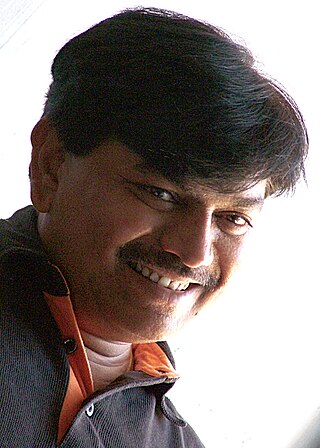
Sanju Vala is an Indian Gujarati-language poet and literary critic Gujarat, India. He has authored more than 10 books and received numerous literary awards.

Anil Chavda is a Gujarati language poet, writer and columnist from Gujarat, India.

Harshad Trivedi is a Gujarati language poet, short story writer, critic and editor from Gujarat, India. He was an editor of Shabdasrishti, an organ of Gujarat Sahitya Akademi, from 1995 to 2015. Trivedi has served in different positions at several Gujarati literary institutions. As of 2023, he is a president of Gujarati Sahitya Parishad.
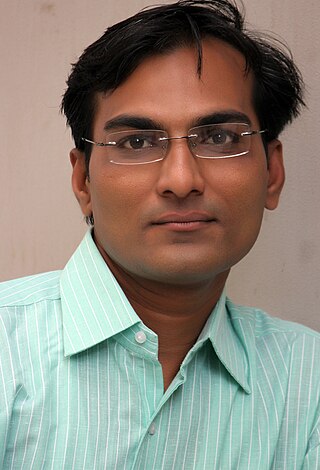
Ashok Chavda, also known by his pen name Bedil, is a Gujarati poet, writer and critic from Gujarat, India. His anthology of poetry, Dalkhi Thi Saav Chhutan (2012), was awarded the Yuva Puraskar by the Sahitya Akademi in 2013. His collection of known writings include Pagla Talaavma (2003), Pagarav Talaavma (2012), Tu Kahu Ke Tame (2012), Pityo Ashko (2012), Shabdoday (2012), and Ghazalistan (2012), which is a translation of Urdu ghazals written by Indian and Pakistani poets. He is also a recipient of the Yuva Gaurav Award (2012) from the Gujarat Sahitya Akademi, and the Dasi Jivan Award (2013–14) from the Government of Gujarat. He has appeared in several TV and radio programs on All India Radio and Doordarshan.
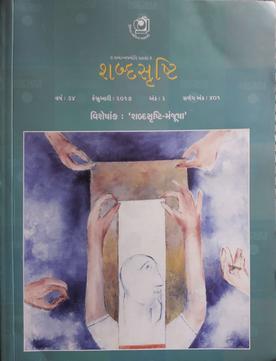
Shabdasrishti, the journal of the Gujarat Sahitya Akademi, is a Gujarati literary magazine, published on the fifth of every month. The magazine was started in 1983, a year after the establishment of the Akademi. Shabdakhya Jyoti Prakasho is a motto of this magazine.
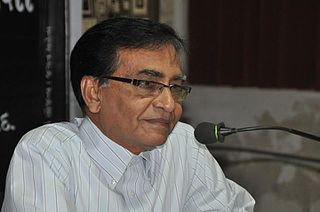
Suman Shah is a Gujarati language critic, short story writer, novelist, essayist, editor and translator from Gujarat, India. He won the Sahitya Akademi Award in 2008 for his short story collection Fatfatiyun. He has written both in the modern and in the postmodern eras in Gujarati literature. He has authored more than 74 books, including 2 novels, 6 short story collections, 4 collections of creative essays, 6 translations into Gujarati from English and Hindi, 22 books on literary criticism and around 23 edited works of literary theory and modern Gujarati short stories and poems. He was honorary editor of Shabdasrishti from 1983 to 1986 and an editor of Khevna, a literary journal, from 1987 to 2009.

Rajendra Patel is a Gujarati language poet, short story writer and critic from Gujarat, India. He has served as Vice President of Gujarati Sahitya Parishad since 2014. His significant works include Jueeni Sugandha, Shri Purant Janse and Avagat. Gujarat Sahitya Akademi awarded him three times for his poems, short stories and criticism. His book Jueeni Sugandh was translated by Navneet Thakkar in Hindi as Juhi Ki Mahak (2007). He also served in the editorial team of Shabdasrishti, a monthly magazine published by Gujarat Sahitya Akademi.

Harish Krishnaram Dave, better known by his pen name Harish Meenashru, is a Gujarati language poet and translator from Gujarat, India. He is best known as a postmodern poet in Gujarati literature. Some of his significant works include Dhribaangsundar Eni Pere Dolya (1988), Suno Bhai Sadho (1999), Tandul (1999), Parjanyasukta (1999), and Banaras Diary (2016). His poems have been translated in Hindi, Marathi, Malayalam, Kannada, German, and English. He received a Kalapi Award (2010), Vali Gujarati Gazal Award (2012), and Narsinh Mehta Award (2014). He received the 2020 Sahitya Akademi Award for his poetry collection Banaras Diary (2016).
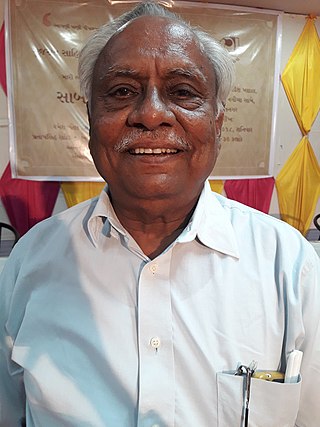
Ashokpuri Goswami is a Gujarati poet and writer from Gujarat, India. He won Sahitya Akademi Award for Gujarati language in 1997 for his novel Koovo (1994).
Kamal Vora is a Gujarati language poet and editor from Mumbai, India. He is an editor of Etad, a quarterly Gujarati literary magazine.

The Gujarat Sahitya Akademi or Gujarat Sahitya Academy, established in 1981, is a government institution dedicated to the development of the languages spoken in Gujarat, India and their literature. Gujarati, an official language of Gujarat, is one of them; the others are Hindi, Sanskrit, Kutchi, Sindhi and Urdu. As of 2022, Bhagyesh Jha is the chairman of the Akademi.

Manisha Joshi is a Gujarati language poet and journalist. She is an author of four poetry collections including Kandara (1996), Kansara Bazar (2001), Kandmool (2013), and Thaak (2020). She currently lives in California.
Rasiklal Chhotalal Parikh (1897–1982) was a 20th-century Gujarati poet, playwright, literary critic, Indologist, historian, and editor from Gujarat, India. He was the president of Gujarat Sahitya Sabha and was appointed the president of Gujarati Sahitya Parishad in 1964. He received the Sahitya Akademi Award in 1960 for his play Sharvilak. He is also a recipient of the Ranjitram Suvarna Chandrak and the Narmad Suvarna Chandrak.

Vasantavilas is a fagu poem by unknown author written in old Gujarati language, believed to be written in first half of the 14th-century. Its theme is the depiction of Shringara, an erotic sentiments. The poem has a significant historical value as it provides linguistic evidence of Old Gujarati.
References
- 1 2 3 Tripathi, Salil (27 May 2021). "The Pandemic Poetry of Indians Has Roused Readers Far and Wide". Mint. Archived from the original on 6 October 2021. Retrieved 6 October 2021.
- 1 2 3 Biswas, Soutik (20 June 2021). "Parul Khakhar: The Indian Stay-at-home Mum Trolled For Poem on Covid Dead". BBC News. Archived from the original on 6 October 2021. Retrieved 6 October 2021.
- 1 2 3 4 5 6 7 Trivedi, Deepal (15 May 2021). "BJP Furious as Top Gujarati Poet Blames 'Naked King' Modi for Corpses Floating in the Ganga". The Wire. Archived from the original on 7 October 2021. Retrieved 29 Sep 2021.
- 1 2 3 Susan, Nisha (25 Jun 2021). "The Uncertainty of the Artist". Mintlounge. Archived from the original on 29 September 2021. Retrieved 29 Sep 2021.
- 1 2 3 4 5 Tripathi, Salil (28 May 2021). "The Poem That's Channelling India's Anger About the Pandemic". the Guardian. Archived from the original on 9 October 2021. Retrieved 29 Sep 2021.
- 1 2 3 Doshi, Tishani (5 July 2021). "Flogged, Imprisoned, Murdered: Today, Being a Poet Is a Dangerous Job". The Guardian. Archived from the original on 4 August 2021. Retrieved 21 September 2021.
- ↑ "'Conspiracy' by 'Literary Naxals': Gujarat Sahitya Akademi Criticises Poem on Corpses Found in Ganga". Scroll.in. 10 Jun 2021. Archived from the original on 8 October 2021. Retrieved 8 Oct 2021.
- ↑ "Gujarati Writers, Readers Condemn Sahitya Akademi's Vilification of Poem on Ganga Corpses". The Wire. 18 June 2021. Archived from the original on 8 October 2021. Retrieved 8 Oct 2021.
- ↑ "Ein Gedicht erschüttert Indien: Im Ganges fließt nur der Tod". Frankfurter Allgemeine Zeitung (in German). 21 May 2021. Archived from the original on 8 October 2021. Retrieved 8 Oct 2021.
- ↑ Devkala, Mehul (20 May 2021). "Gujarati Poem Criticises Govt's Handling of Covid Resurgence". Telegraph India. Archived from the original on 6 October 2021. Retrieved 6 October 2021.
- ↑ Shah, Prakash N. (28 May 2021). "'શબવાહિની ગંગા'ની સાખે" (in Gujarati). Archived from the original on 2021-06-28. Retrieved 2021-09-29.
- ↑ Suthar, Babu (28 June 2021). પ્રતિકારની કવિતા [Poetry of Resistance] (in Gujarati). Archived from the original on 2021-06-28. Retrieved 2021-09-29.
- ↑ Vaidya, Kaajal Oza (16 May 2021). "માય સ્પેસ: દુઃખ પારાવાર... મૂઈ આ સરકાર !". Divya Bhaskar (in Gujarati). Archived from the original on 18 May 2021. Retrieved 5 December 2021.
- 1 2 3 Sharma, Ritu (10 Jun 2021). "Poem on Bodies in Ganga: Gujarat Sahitya Akademi Sees 'Anarchy', 'Literary Naxals'". The Indian Express. Archived from the original on 8 October 2021. Retrieved 8 Oct 2021.
- 1 2 3 Sharma, Ritu (18 Jun 2021). "Litterateurs Demand Withdrawal of Gujarat Sahitya Akademi Editorial". The Indian Express. Archived from the original on 29 September 2021. Retrieved 29 Sep 2021.
- ↑ Desai, Nachiketa (18 Jun 2021). "Gujarati Writers, Poets and Artists Condemn State Sahitya Academy For Maligning Poet Parul Khakkar". National Herald. Archived from the original on 8 October 2021. Retrieved 8 Oct 2021.